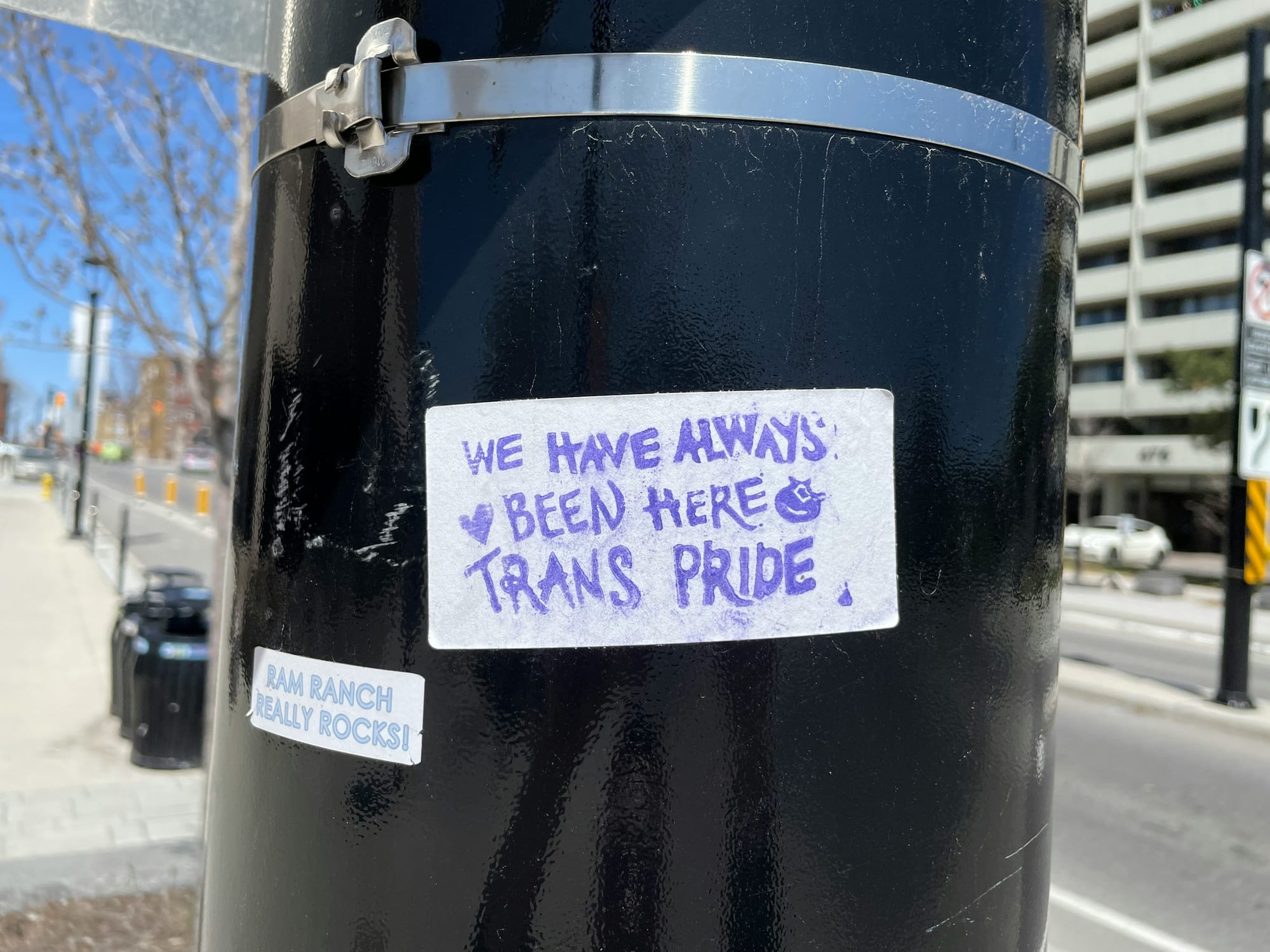Do they think trans people are people?

It's been baffling and horrifying to watch the transphobic moral panic grow and mutate in the UK and around the world over the last decade or so. Something about it has felt to me so childish.
Here in the UK, there existed a pack of fun, irreverent (white, middle class) feminist writers who didn't seem to recognise that, with their columns in the Times, the Guardian, the Telegraph, wherever, they were the establishment. But that was kind of fun in and of itself. It was nice to have feminism entrenched in the establishment.
And this group wrote – and wrote well – about issues that were and remain important. They wrote about the gender pay gap, they wrote about sexual and domestic violence, they wrote about street harassment.
They didn't seem to notice that in less established spaces, feminism was changing. People without broadsheet columns had started talking about intersectionality. On twitter, on youtube, on newer, grungier websites people were calling attention to the specific additional issues facing women of colour, gay women. Trans women.
It was the best. One of the first things that happened to me when I became extremely online was that I saw video essays by trans people explaining the difference between sex as assigned at birth and gender identity, talking about the barriers to healthcare, about the threats of violence.
I got so quickly so educated so passively. I didn't seek any of this out! It was simply put in front of me and I'm so grateful for that. It felt, in the early 2010s, like we were all taken the next logical step towards greater equality and acceptance.
But when this bunch of columnists were asked to be a little more inclusive in their language, a little more aware of women's issues beyond those faced by the white middle classes, they lost their damn minds, and they made it everyone's problem. It felt like they resented the suggestion that they shouldn't always be the centre of attention. Like conservative reactionaries the world over they clung to their own sense of victimhood at the expense of a connection with a wider, more varied community.
They have spent the last decade building themselves a wall of gotcha phrases that protects them from the horrifying ordeal of having to consider that other people are, like, people. This is the thing that I come back to over and over again.
You can say large gametes all you want, you can crow about the definition of the term woman, you can parrot your fifth form science understanding of biology loudly and furiously, but at the end of the day I'm still going to wonder if you really think that trans people are people.
Do you know what I mean?
When you, a common or garden terf, think about yourself, what is it that you think makes you human? When you consider the richness and complexity of your thoughts and feelings? When you remember those times you've experienced profound awe or joy or grief? When you think about the hardest decisions you've made and the emotional process of making them?
Do you believe that trans people have also experienced life in that way?
If you don't, then what do you think that says about you?
And if you do then why do you insist that you know better than them who they really are?
People have always had a tendency to assume we're at the end of scientific discovery, at the end of history. That's what gives us the illusion that humanity progresses in a linear fashion. We know better now than we did in the past and because we know better we assume we know best.
I think this is a limit on our imagination – we're not good at imagining what we might discover about ourselves. You even see this in science fiction. We tell endless stories about what we might invent or what we might discover in space or in the ocean. We don't tell very many that look inwards.
Maybe it's also because we're uncomfortable with how much of our physical reality is a mystery. When you get sick, you want to believe that there will be a clear answer and a straightforward solution. That there often isn't is one of the most terrifying aspects of our existence. So it's understandable that we don't want to look at that too closely.
I think this tendency is even bigger in the modern era. The amount of scientific discovery we've made in the last couple of hundred years is astonishing, and it's allowed us to put a divide between ourselves and those who lived before us.
We are modern and scientific, they were old fashioned and superstitious.
It's not so very long ago that Ignaz Semmelweis was laughed out of the medical profession and into a mental institution for suggesting that doctors wash their hands after handing cadavers.
Semmelweis was a doctor at Vienna General Hospital, which had two maternity wards. One was used to train midwives, the other obstetricians. Women giving birth were more than twice as likely to die in the one staffed by obstetricians.
Some women chose to give birth in the street rather than be admitted to that ward and they too were less likely to die.
Semmelweis observed the two clinics and came to the conclusion that what was causing the high death rate was the fact that the medical students also handled corpses and the midwives did not. He theorised that something invisible was being carried on the hands of doctors from autopsy rooms to delivery rooms and it was killing people. He recommended doctors wash their hands in chlorinated lime to prevent those deaths and while this was successful at his hospital, the wider medical community saw it as ridiculous.
It's easy to look back on those doctors who didn't believe him with scorn. How unscientific. But I think the problem was the exact opposite. These were men of science. They believed in hard evidence. Something invisible being carried from room to room? At best that's unprovable, at worst it's magic.
They couldn't know that if they wanted hard evidence, all they needed to do was invent microscopes, and they felt uncomfortable accepting recommendations based on the softer evidence that was all those dead women.
We aren't better than them. We aren't smarter. We aren't more dedicated to science. We just have microscopes.
Actual scientific study may have improved a little in this regard but bystander opinion has not.
The terves, I think, genuinely believe they are being scientific when they use the phrase biological woman but in truth it's a deeply unscientific term. Both because it's a rejection of the actual scientific term, cis, and because it's predicated on the idea that we already know everything there is to know about human biology.
They reject the knowledge of actual biologists when they use this term, because a complex understanding of human biology refutes their claims. I wonder sometimes if what they're looking for – or not what they're looking for but what they insist is needed – is biological causation.
We can say, biologically, why someone's eyes are blue, why they're tall, why they're predisposed to certain diseases, right? But we can't say, biologically, why someone is trans. Yet.
The terves cling to their chromosomes X and Y (I'm willing to bet none of them know any of the other pairings) because they refuse to consider that there is something as significant as DNA that we just don't know about.
It is surely much more scientifically accurate to say that we don't yet understand the biological cause of transness.
We have not developed the technology to fully understand this aspect of humanity, or if we have we haven't pointed it in the right direction. We don't have hard evidence of what causes some people to be trans, and in its absence terves refuse to admit the softer evidence that is the lived experience of trans people.
Or, for that matter, the expertise of the doctors who have treated them. It's those doctors who went from treating gender dysphoria as a psychological disorder to a medical condition. Who shifted from prescribing counselling, medication, and electro shock therapy, to recommending transitioning. This shift didn't happen on a whim, it is backed by decades of medical experience.
Trans people have always existed. There is evidence of them throughout time and across cultures. I'm not talking just about specific historical figures about whom there is evidence of gender fluidity or transness – I'm talking about language. The world, before it was colonised by European christians who imposed their restrictive views of gender and sexuality on everyone, saw and acknowledged trans people.
You can campaign all you want, you can run bigoted lawsuits all the way up to the supreme court, you can wang on about bathrooms and sports and social contagions, but you cannot escape the reality that trans people exist. Which means there's really only one question that remains.
Do you believe they are as fully and profoundly human as you are?
